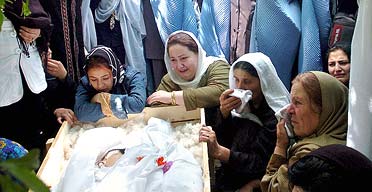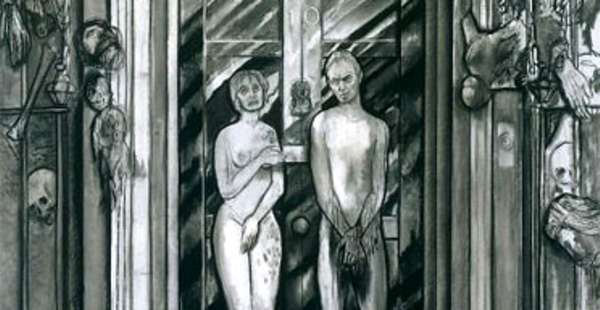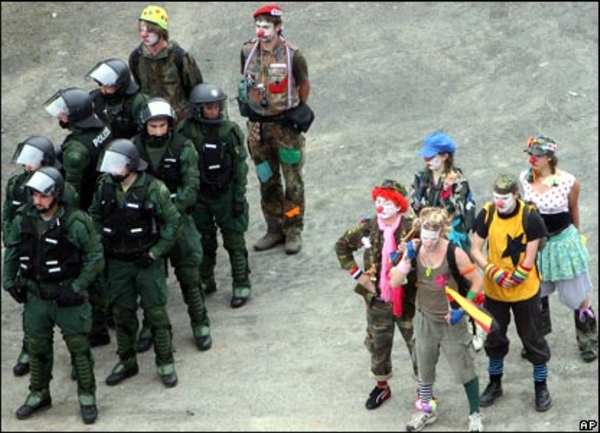
JUNE 2007
stoppress stoppress stoppress !!
 June6th'07
June6th'07
A prominent female Afghan journalist has been gunned down inside her home near Kabul, the second such slaying in five days.
Unidentified gunmen fired seven bullets into Zakia Zaki, head of a local radio station, as she slept with her eight-month old son last night. She died instantly.The shooting occurred in Parwan, a normally peaceful district north of Kabul that includes the giant American airbase at Bagram. It is not normally associated with Taliban activity.
The interior ministry condemned the "act of terror" and police said they had detained four men in connection with the case today.
Zaki, 35, had run the US-funded station Peace Radio since the fall of the Taliban in 2001. She was also headmistress of a local school and ran for parliament in 2005.She recently received warnings from powerful local commanders to tone down her reporting, according to the Afghan Independent Journalists Association. "This is a very bad day for female journalists. Our work is becoming increasingly dangerous," said Farida Nekzad of Pajhwok, an Afghan news agency, after returning from Zaki's funeral today.The killing underlines the lawlessness that plagues even the most stable parts of Afghanistan and highlights the risks faced by young local reporters, particularly women. Conservative Afghans dislike women's participation in the burgeoning media sector and those who ignore warnings from hostile male relatives have been killed.
On Friday Sanga Amach, a 22-year-old news presenter with a private television, was murdered at her Kabul home. A western security official in Kabul said it appeared to have been an honour killing.Her death echoed a similar one two years ago, when a popular young presenter was also slain in her home. The main suspects were male relatives who felt the woman's behaviour had impugned the family honour.
President Hamid Karzai's government has introduced several measures to encourage women into the workplace and politics. One quarter of seats in the national parliament are reserved for women. But progress has been hindered by poor education, increasing violence and hostility from Afghan men unused to a woman's criticism.Last month Malalai Joya, Afghanistan's most outspoken female parliamentarian, was banned from the national assembly after she compared her fellow MPs to barnyard animals. Meanwhile in the conflict-affected southern provinces hundreds of girls' schools have closed following a Taliban anti-education campaign of intimidation and arson.

The centre panel of Iraq
Triptych, 2007, by Michael Sandle.
Sandle has no particular reputation for political artwork but the human cost of warfare has played a prominent part in his sculpture. Two of his best-known works in London are the Malta Siege Memorial in Trinity Gardens, Lambeth, and the Seafarers' Memorial at the headquarters of the International Maritime Organisation.
"I am very aware of the way that Britain has a habit of interfering overseas," he said. "Years ago I did a Mickey Mouse machine-gun sculpture as a comment on the Americans in Vietnam. I was interested to discover from my historical research how we'd meddled with the place after the Japanese surrender. It wasn't the Americans who started it and it wasn't the French. It was us." The stark drawing, entitled Iraq Triptych, will hang in the exhibition's Gallery V alongside a group of romantic watercolours and a drawing of British troops on the Somme battlefield in the first world war at an outpost nicknamed Moo Cow Farm.
The gallery was hung by the Scottish artist Barbara Rae after Sandle's work triumphed in the complex judging process which whittles more than 9,000 entries down to about 1,200. Sandle said: "I was expecting them to find it a dark corner somewhere so this is all a very nice surprise.
Venice Biennale director storms out amid war of words
By Andrew Johnson
Published: 03 June 2007
One of the most prestigious international cultural events, the 52nd Venice Biennale, which begins next Sunday, has been plunged into controversy after its managing director quit amid a welter of snide remarks and angry accusations.
Renato Quaglia said he had become exasperated with the exhibition's curator, the esteemed American art historian and painter Professor Robert Storr.
Mr Quaglia said the final straw came when the bill for the festival came in a million euros over budget.
The festival is the Olympics of the art world, with artists representing their countries.
"I have not gone over budget," Professor Storr told The Art Newspaper. "This is my world and I know how it works. I gather Mr Quaglia is very well informed about theatre. From my experience, he seems to know very little about visual art."
************************
The first time Damien Hirst's art has been correctly
described:
| ENTERTAINMENT Hirst unveils £50m diamond skull BBC World News |
the art of corraborating with merchants of fear.
*************************
anti-globalisation protest:

White House nears completion of new torture guidelines
Critics say administration's endorsement of 'enhanced interrogation' is 'immoral,' draw comparisons to Nazi war crimes.
By Arthur Bright | csmonitor.comThe White House is close to completing a new set of guidelines on the use of "enhanced interrogative techniques" by US agents, even as critics say such techniques are "immoral," "amateurish," and "indistinguishable" from Nazi war crimes.
The New York Times reports that the administration is preparing "secret new rules governing interrogations."
The Bush administration is nearing completion of a long-delayed executive order that will set new rules for interrogations by the Central Intelligence Agency. The order is expected to ban the harshest techniques used in the past, including the simulated drowning tactic known as waterboarding, but to authorize some methods that go beyond those allowed in the military by the Army Field Manual.
The Times writes that President Bush has claimed the broader techniques are needed to fight terrorism, and in the recent Republican presidential debate, candidates made similar suggestions about the necessity of harsh interrogation.
Critics, however, say that the Bush administration's policy regarding torture is "immoral." Philip Zelikow, a former advisor to Condoleezza Rice and the executive director of the 9/11 Commission, said in a lecture last month (PDF) at the Houston Journal of International Law "The core of the issue, for legal policy, is this: What is moral – not, what is legal? What is cost-beneficial? ... My own view is that the cool, carefully considered, methodical, prolonged, and repeated subjection of captives to physical torment, and the accompanying psychological terror, is immoral. I offer no opinion as to whether such conduct is a federal crime; merely that it is immoral. "
Andrew Sullivan, a conservative blogger for The Atlantic, writes that many of the interrogative techniques being condoned by the Bush administration were used by the Nazis in the 1930s and 40s [Editor's note: The article contains a graphic photo.], and resulted in the convictions of the interrogators for war crimes. Mr. Sullivan notes the similarities between the "enhanced interrogation" employed by the Nazis and techniques condoned by the Bush administration, as well as parallels between the defenses presented at trial by the Nazis and the justifications offered by the White House.
The victims, by the way, were not in uniform. And the Nazis tried to argue, just as [former Department of Justice official] John Yoo did, that this made torturing them legit. The victims were paramilitary Norwegians, operating as an insurgency, against an occupying force. And the torturers had also interrogated some prisoners humanely. But the argument, deployed by Dick Cheney, Donald Rumsfeld, and the Nazis before them, didn't wash with the court [which found them guilty]. ...
Critics will no doubt say I am accusing the Bush administration of being Hitler. I'm not. There is no comparison between the political system in Germany in 1937 and the U.S. in 2007. What I am reporting is a simple empirical fact: the interrogation methods approved and defended by this president are not new. Many have been used in the past. The very phrase used by the president to describe torture-that-isn't-somehow-torture - "enhanced interrogation techniques" - is a term originally coined by the Nazis. The techniques are indistinguishable. The methods were clearly understood in 1948 as war-crimes. The punishment for them was death.
Christian Science Monitor